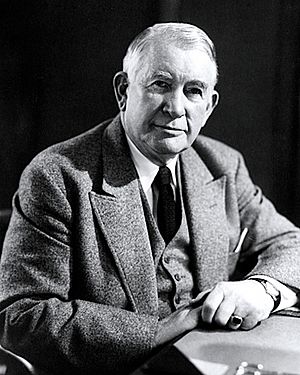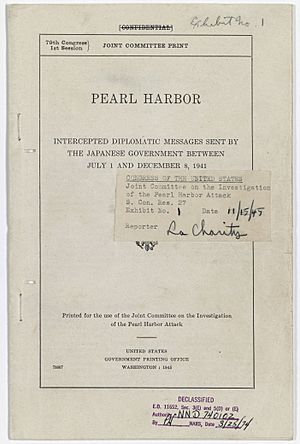United States Congressional Joint Committee on the Investigation of the Pearl Harbor Attack facts for kids
The Joint Committee on the Investigation of the Pearl Harbor Attack was a special group of lawmakers. It was also known as the Pearl Harbor Committee. This group included members from both the United States Senate and the United States House of Representatives. They formed after World War II to find out why the 1941 attack on Pearl Harbor happened. They also wanted to suggest ways to prevent future attacks. The idea to create this committee passed in the Senate on September 6, 1945. The House of Representatives agreed on September 11, 1945. The committee shared its final report on June 20, 1946.
Contents
Why the Committee Was Formed
After the surprise attack on Pearl Harbor on December 7, 1941, many investigations took place. President Franklin D. Roosevelt ordered one of these early investigations. Another was done by the army and navy. President Harry S. Truman shared their findings in August 1945.
However, the U.S. Congress waited to start its own investigation. They wanted to focus on winning World War II first. Just four days after Japan officially surrendered, Senator Alben W. Barkley suggested a new idea. He wanted to create a joint committee. This committee would look into any "contradictions and inconsistencies" in the earlier reports.
Both the Senate and the House quickly agreed to Senator Barkley's plan. This created the Joint Committee on the Investigation of the Pearl Harbor Attack. The committee had 10 members. Five were from the House of Representatives and five from the Senate. Senator Barkley was chosen to lead the group. Their job was to investigate "facts relating to the events and circumstances" around the attack.
The committee was first supposed to finish its report by January 3, 1946. But Congress gave them more time to hear from people. From November 1945 to May 1946, the committee listened to 44 witnesses. These included important military leaders like Admiral Husband E. Kimmel and General Walter Short. They also heard from former ambassador to Japan Joseph Grew and former secretary of state Cordell Hull. All their talks filled over 5,000 pages of notes. There were also about 14,000 pages of documents and evidence.
Who Was on the Committee

Here are the people who were part of the committee:
- Chairman: Senator Alben W. Barkley (Democrat from Kentucky)
- Vice Chairman: Representative Jere Cooper (Democrat from Tennessee)
- Other Committee members:
- Senator Owen Brewster (Republican from Maine)
- Representative J. Bayard Clark (Democrat from North Carolina)
- Senator Homer S. Ferguson (Republican from Michigan)
- Representative Bertrand W. Gearhart (Republican from California)
- Senator Walter F. George (Democrat from Georgia)
- Representative Frank Bateman Keefe (Republican from Wisconsin)
- Senator Scott W. Lucas (Democrat from Illinois)
- Representative John W. Murphy (Democrat from Pennsylvania)
How the Investigation Worked
Before the committee started, President Truman issued an order. It told government groups not to share information about a secret U.S. program. This program had broken Japanese coded messages. When Congress formed the Pearl Harbor Committee, some members were upset. They felt the government was holding back important information.
President Truman then changed his order. He told some people to share "any information in their possession material to the investigation" with the committee.
Even though many investigations had happened before, some files about the attack were still missing. Senator Owen Brewster suggested that individual committee members should be able to look at any records they thought were important. He felt this would help find missing documents. However, the committee voted against his idea.
Senators Homer Ferguson and Owen Brewster were experienced investigators. They were frustrated by the committee's decision. They argued that they should have the same access to records as other past investigations. Senator Brewster said the Pearl Harbor investigation should look for new information. He felt it should not just review what was already known.
Sometimes, disagreements about how to run the committee led to arguments among the senators. Some thought the Republicans were just trying to find something to blame President Roosevelt. But Senator Brewster said he only wanted to "explore the files."
These debates were partly because some Republicans worried about Senator Barkley. They wondered if he could be fair. Barkley had been very close to President Roosevelt for a long time.
What the Committee Found
Eight members of the committee signed the main report. They found that leaders in Washington and Hawaii knew about the danger of an air attack. They said that military leaders made "errors of judgment" but did not fail in their duties. The report also said that President Roosevelt and his advisors did not trick Japan into attacking the United States.
Senators Brewster and Ferguson wrote a separate report. They disagreed with the main findings, calling them "illogical." They felt that the full story was "far from complete."
In the end, the committee still had many questions. They wondered why Pearl Harbor happened, especially with so much good intelligence available. The final report noted that different government groups did not work well together. This hurt how effective intelligence was.
Even though the findings were not perfect, the committee's suggestions had a big impact. The main report suggested putting "operational and intelligence work" in one place. It also recommended making clearer rules for who was responsible for what in intelligence agencies.
Some of these ideas became law when Congress passed the National Security Act of 1947. This law combined the military into a new Department of Defense. It also created the Central Intelligence Agency (CIA). The CIA's job is to gather and understand information about national security.
The committee concluded that Japan was ultimately responsible for the attack. They also stated that the United States' diplomatic actions did not give Japan any good reason to attack.
How the Public Reacted
The Pearl Harbor investigation did not grab public attention as much as other big Senate investigations. After four long years of war, people were tired. They wanted peace and to move forward. News reports often showed the committee as divided by politics. Headlines sometimes read: "Angry Senators Debate on 'Records' of Pearl Harbor."


